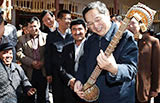The 5th Dialogue between American and Chinese college students
(CRI) Updated: 2015-09-23 18:14Ten students from colleges and universities including Middlebury College and The George Washington University in the US, Renmin University of China and Communication University of China, along with guests took part in the 5th Dialogue between American and Chinese College Students to share their understanding of Sino-US relations through their daily lives at China Radio International in Beijing on Tuesday, coinciding with President Xi Jinping's visit to the US.
The 5th Dialogue attracted 120,000 Internet users' attention and praise within an hour of its worldwide broadcast through radio, television and social media sites, especially Facebook.
With the theme "How much do we know about each other?" the students participating talked of campus life, career plans, social culture and major-country relations such as the Sino-US relationship.
William Weightman, a panelist from Middlebury College, said he believed there is an outdated mindset in the United States about what is happening in China.
"It's quintessential that Americans improve their understanding of Chinese people, Chinese language and Chinese culture. As an American, I can say the biggest room for improvement is for understanding different political cultures that exist in our two countries. I think that there is a very strong misunderstanding of what the Chinese government is, how it functions, and how it makes decisions. Some of the current rhetoric you would hear in the United States is that China is authoritarian and the government doesn't represent the people. But I have talked to many Chinese people that have presented opposite opinions that have broadened my perspective and helped me think how government functions in different context," Weightman said.
His thoughts were echoed by a Chinese college student Wu Benyang, who believed one of the biggest challenges for Chinese people is to better understand how the political systems differ. Wu studies at the University of International Relations in China.
"The biggest impediment would be that we think differently, so it would be hard for me to understand other people's viewpoints, like it would be hard for my country to understand other countries' diplomatic policies from their perspectives. Again that's why communication is so important between Chinese and American people, especially the young people. And I'm very glad that I'm here,"said Wu.
Elizabeth Woods from Georgetown University in Washington had a very optimistic view of the future of the Sino-US relationship.
"Just consider the fact that President Obama and President Xi are right now in Washington discussing current issues. I think that in itself is a signifier that we will continue to have a healthy relationship, open communication and I think through dialogues such as this, we can ensure that China and America will fact be friends in the future and unite on international issues," she said.
Teng Jimeng, an Associate Professor of American Studies at Beijing Foreign Studies University, said he believed opportunities such as the dialogue will help bridge the gap between the American and Chinese people.
"The dialogue is very interesting and I hope more American students can travel and study in China to experience and understand Chinese society. The longer you stay in China, the more knowledge you will acquire about the ancient country's people and culture," said Teng.
Xia Jixuan, deputy president of China Radio International, also supported the event and said: "The face-to-face talks between students from China and US undoubtedly enhances understanding towards each other and eliminates misunderstandings and prejudices".
He added: "I expect that in the future, more people will either take part in these discussions, or watch the discussions on different terminals, so they will be part of the discussion. They raise their questions for the panelists to discuss. Only by attracting more people to these activities can we promote better understanding between these two countries."
This year's dialogues, hosted by NEWSPlus Radio on China Radio International, were first jointly held on Sept 16, with New York University Shanghai, the first University run jointly by China and the US.
- Li: Blasts must bring harsh penalty
- Students' satellite launched into space
- Holidays spark shopping spree
- White paper on women's development
- China urges faster, cheaper Internet by year end
- Courts to avoid judgments in weak cases
- Scenic high-speed rail route opens in Jilin
- Upgraded combat drone is unveiled
- Supreme People's Court to boost judicial transparency
- China plans to record suspect questioning







